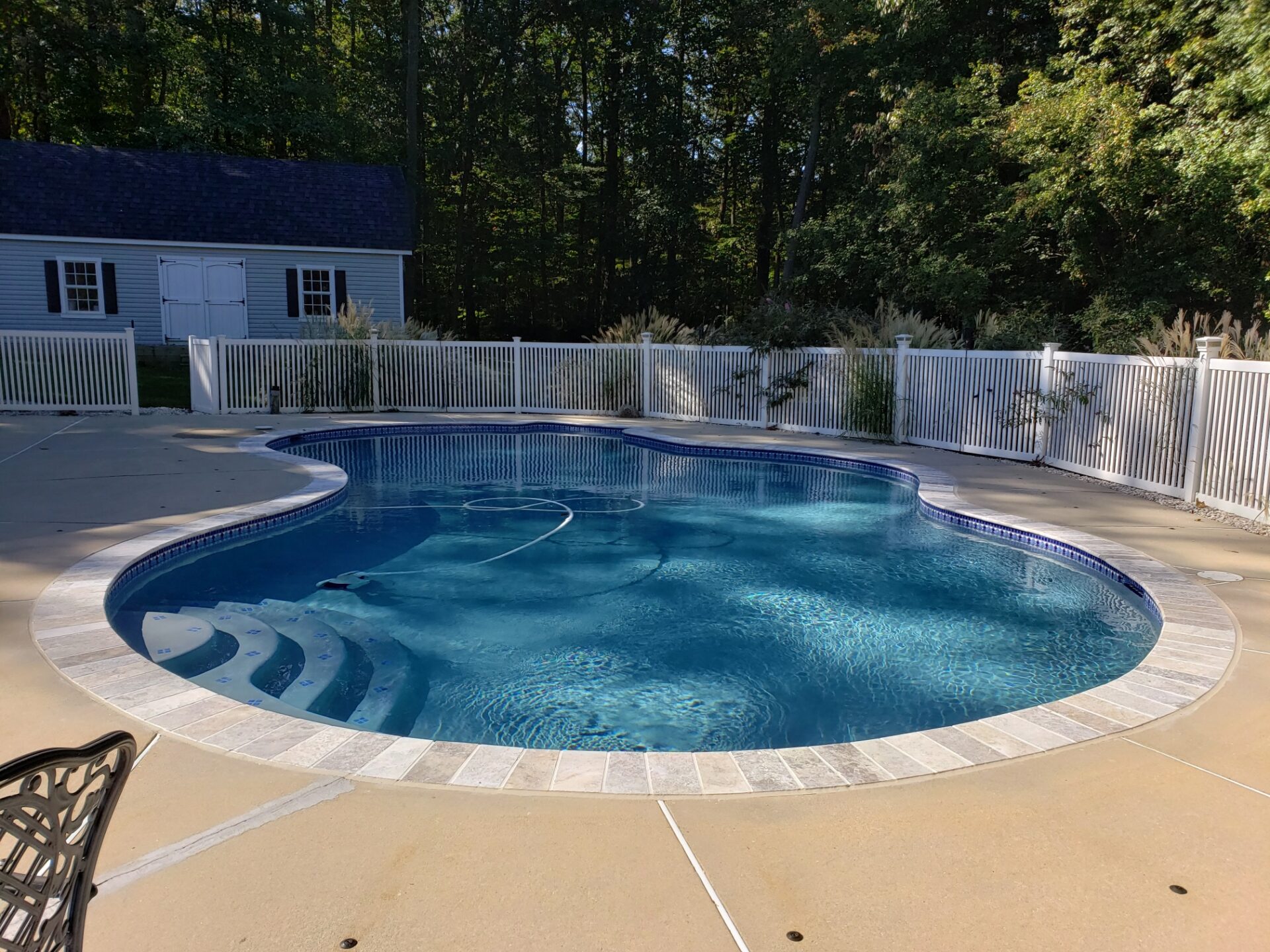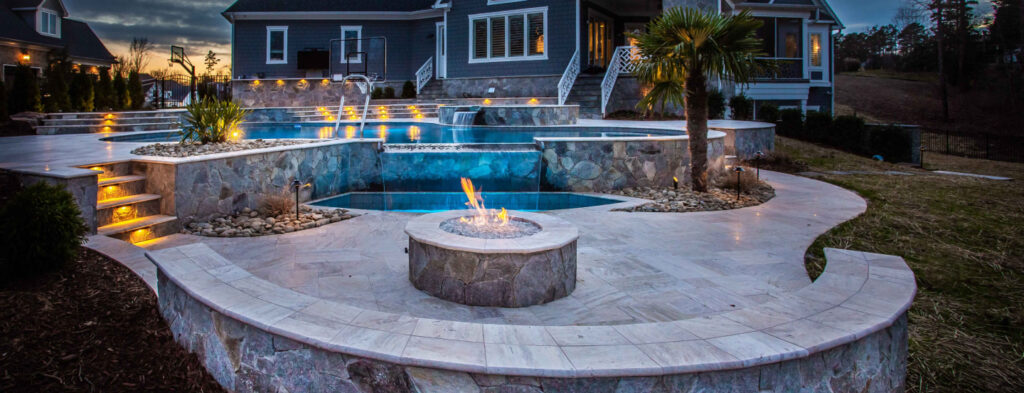Several factors influence the cost of pool installation in Connecticut. Let’s dive into these factors more in-depth.
1. Pool Material
The material you select for your pool plays a major role in determining the overall cost. There are three primary pool materials to choose from — concrete, fiberglass, and vinyl — each with its own characteristics, which we’ll explore below:
Concrete Pools
Concrete pools (also known as gunite) are made from a mixture of cement, sand, and water. They are a popular choice due to their durability and ability to be customized in terms of shape and size. These pools can last 50 to 100 years or more with proper maintenance, often outlasting other pool types. While they tend to have a higher initial cost, their long-term durability makes them a solid investment. Concrete pools are considered one of the best options for homeowners who want a pool that offers both strength and design flexibility.
Fiberglass Pools
Fiberglass pools are made from a durable, pre-formed shell of fiberglass-reinforced plastic. They are priced similarly to concrete pools. While fiberglass pools typically last around 25 years, they offer a low-maintenance option with a smooth surface that helps prevent algae buildup and simplifies cleaning.
Vinyl Pools
Vinyl pools are the most affordable option upfront, made from a flexible liner that is placed over a steel or polymer frame. While they are budget-friendly, they typically require more frequent maintenance and liner replacements, usually every 10 years. The liner can be susceptible to damage from sharp objects or extreme weather conditions, which may result in costly repairs. Despite these factors, vinyl pools remain a popular choice for those looking for an affordable option with a relatively quick installation process.
2. Size & Depth of the Pool
The size and depth of the pool play a significant role in determining the cost as well. Larger pools and those with greater depths generally come with a higher price tag. Most standard backyard pools range between 10-20 feet wide, 20-40 feet long, and 5-8 feet deep. As expected, the cost tends to increase as the pool size and depth grow.
3. Site Preparation & Excavation
Connecticut’s diverse topography also affects pool costs. For instance, if your property requires extensive excavation due to rocky terrain or uneven land, it can increase construction expenses. Similarly, factors like soil composition and drainage considerations may influence the choice of pool foundation materials, such as concrete or fiberglass, further impacting costs.
4. Pool Add-ons & Features
Connecticut’s proximity to the coast and abundant natural landscapes often inspire homeowners to incorporate distinctive features like infinity edges, beach entries, and natural stone finishes into their pool designs. While these features can significantly enhance aesthetics, they also add to the overall cost. Optional add-ons, such as lighting, jump boards, water features, heaters, and water purifiers, can further increase construction expenses.
More complex elements like a sunken bar, fire pits, or outdoor kitchens can also be incorporated, elevating both functionality and design. Additionally, safety features such as pool covers and motion sensors are important considerations. By working with a reputable local pool builder who understands Connecticut’s climate and terrain, homeowners can optimize their choices to balance costs without compromising on quality or design.
5. Utilities
In Westport, Connecticut, there are several utility costs to consider after the initial build of your new pool. While Anthony & Sylvan covers the initial water fill for your pool, you’ll still need to factor in the ongoing costs of circulating the water, which can increase your water bill. Running the pool’s pump and filtration system also contributes to higher electricity usage, resulting in an increase in your electric bill. The average monthly cost to run a pool pump ranges from $30 to $150, depending on the pump type, size, and usage duration.
6. Local Permits & Regulations
In Connecticut, pool requirements typically include obtaining a permit, adhering to zoning regulations (such as setbacks and fencing), ensuring proper safety measures, and meeting specific health department standards for pool construction and operation. These factors can impact both the design and cost of your pool. Additionally, obtaining the necessary permits and ensuring your pool meets all local codes can introduce additional fees, such as application costs and charges for professional services to prepare and submit required documents.
At Anthony & Sylvan Pools, we handle all the necessary permits and ensure your pool complies with local regulations. Since pricing and requirements can vary by county, it’s essential to consult with a local expert who understands how these factors can influence your project. This ensures that your pool is built to code while managing costs effectively.
7. Taxes
Adding an inground pool in Westport, Connecticut, can increase your home value, by 5-7% on average, but it may result in higher property taxes as well. However, if the pool is medically necessary (such as for physical therapy), you may want to consult with a tax professional to determine if any deductions or exemptions are available. It’s important to factor in potential changes to your property taxes when budgeting for your pool project.
8. Insurance
When adding a pool to your property, it’s important to update your homeowner’s insurance policy. Typically, your premiums will see a slight increase — around $50 annually on average. Your policy will help cover potential damage to the pool, as well as provide liability protection in case of accidents or injuries that occur around it. Make sure to discuss the specifics with your insurance provider to ensure you’re fully covered for both property and liability risks associated with your new pool.
9. Maintenance
Along with the initial construction expenses, regular maintenance is crucial to keep your pool in top shape. This involves tasks such as maintaining chemical levels, cleaning the pool, and vacuuming debris.
| Type of Maintenance |
Frequency |
Average Cost |
| Cleaning and chemical balancing |
Weekly |
$80-150 per month |
| Drain and filter cleaning |
Every 3-6 months |
$60-125 per session |
| Opening/closing the pool |
Biannually |
$150-$300 per event |
Additional Maintenance Considerations By Pool Type
- Concrete Pools: To maintain a smooth surface and counteract wear from extended exposure to water and chemicals, resurfacing is suggested every 8 to 20 years.
- Fiberglass Pools: Over time, fiberglass pools may need gel coat applications to fix scratches or fading.
- Vinyl Pools: The liners of vinyl pools generally need to be replaced every 10 years to keep the pool in optimal condition.
Additionally, the harsh winters in Westport require proper pool winterization, including the use of a pool cover and winterizing chemicals, which can add to maintenance costs during the off-season. These utility and maintenance expenses are important to plan for as part of your pool’s long-term upkeep.









